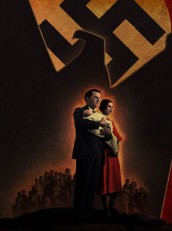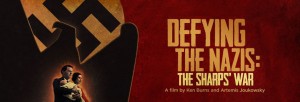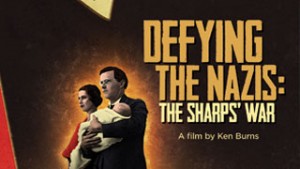DEFYING THE NAZIS: THE SHARPS’ WAR premieres on PBS Tuesday, September 20. The documentary film about a Unitarian couple who smuggled Jews out of Nazi-occupied territory before and during World War II has a behind-the-scenes story that’s almost as interesting as what’s onscreen.
Artemis Joukowsky, directing his first feature, eventually got his friend, the acclaimed documentarian Ken Burns to sign on as co-director. The film came about as a result of Joukowsky learning something unexpected about his maternal grandparents.
ARTEMIS JOUKOWSKY: I was fourteen, and I was at the Allen Stevenson School, and I was given an assignment to interview someone of moral courage, and I went home and said, “Who should I interview?”, and my mom said, “Talk to your grandmother.” I didn’t know my grandmother very well at that time, and I was just diagnosed with my disease, SMA, so I was in a vulnerable place personally, and she was kind of the person who said, “You’re not going to feel sorry for yourself.” So that was the initial experience with her as a person.
KEN BURNS: Artemis is one of the great human beings on Earth. I love him like a brother. This has been an amazing experience for me, and if you think about this – there are 25,000 “Righteous Gentiles” – “Righteous Among the Nations,” non-Jews who’ve helped Jews, Yad Vashem [the Holocaust Memorial Center in Israel] says. Out of that 25,000, five are Americans. And two [of those] are Waitstill and Martha Sharp, who hid their light under a barrel, and were not interested in telling their story.
[Joukowsky] is the grandson of Waitstill and Martha Sharp, and his mother had kept quiet about it. In the film, she expresses the anger that she had back then. She hadn’t told him the story until he was in the ninth grade, because his mom, who’d been abandoned by her parents, was still angry and unresolved about it, until he got an assignment to write a report about moral courage. And it opens this thing up, and it’s a lifelong pursuit. And Artemis himself has dedicated his life to that sort of thing. You can’t help but admire that, particularly in an age when we have a refugee situation in the world that is second only to what it was in World War Two.
[The Waitstills were] this Unitarian minister and his wife from Wellesley, Massachusetts, living a comfortable, middle-class life. They suddenly get a call in December. A month later, they’re in about-to-be Nazi-occupied Prague, escaping Gestapo tails and laundering money among European continents, and getting human beings out on the eve of the war. And then coming home and thinking, “Well, that was the adventure of a lifetime,” and being asked, almost ordered, to go back, and doing it again, leaving their small children again, going back the next year, this time to southern France, the war has started, and getting refugees out at great risk to themselves.
And it begins to erode the opacity of the six million [Jews who were murdered during the Holocaust]. You say “Six million,” and what does that mean, right? And yet, when you see the evidence in the film of the people they saved, you go, “Oh, my God. Each one of those six million could have been this professor emeritus of mathematics, or whatever it is, mathematics or French, in the United States.” They saved Nobel Prize winners. That’s an amazing, amazing story. I just got hooked, and as a storyteller, I just wanted to figure out how to tell it the best we could.
AX: When did you decide this should be a film?
JOUKOWSKY: It started in 1999, when my grandmother had died. A group of filmmakers from King State called me and said, “Let’s look at making a film about your grandmother.” But we realized there was no interest in the story or funding the film until we showed the world who they were. So the first thing we did was spent about four years of getting them honored at Yad Vashem. And that was really the turning point. When Yad Vashem inducted them into their Righteous Gentiles, the whole intention of the project changed, from “Artemis’ family project” to a project that has more of a historical import. People still didn’t know very much about the Sharps. So the last fifteen years has been a partial education of people like Ken and others who might be interested in the story. But it also has been building the narrative, because my grandparents never finished their memoirs. So a lot of what I have done in my life is actually find archivists in different countries, work with historians, and build a narrative of the story itself. And that’s why it’s taken so long, because it wasn’t like we were doing a film on a subject that people knew about that we were going to investigate. We were dealing with a subject that not only did we not know very much about, but that we needed to verify.
AX: Was it difficult for you to interview your own mother?
JOUKOWSKY: I didn’t interview her. I stepped out of the room and a woman named Deborah Schaeffer did the interviews. And that helped me immensely. Because I [came up with questions], but I think if my mom were speaking to me directly, that would have been difficult. There needed to be some sense of safety, that she could say what she wanted to say and not offend me as the interviewer. And I think having a more professional relationship [between non-related interviewer and subject] changes the dynamic.
AX: How did the two of you wind up making this film together?
JOUKOWSKY: I have such respect for Ken. [Before Burns was officially involved] every time I showed him something, he would say, “Well, try these things, do this, and let’s talk in six months.” Even then, his role was my friend and advisor. And Ken takes care of his family and his friends. I was one of those people who he just said, “Okay, I’m going to see if I can help this guy,” never thinking that we would work together at that level. Until I edited the film myself, until I got the film to a place where I thought he would resonate with it. Because up until then, it was really a family story, with a lot of interviews about family conversations. It wasn’t as much an historical story. And I think we put it together in a way that Ken resonated to, and said, “I do want to help you make this happen.”
His films were kind of the mentorship. I would watch his films, see how he constructed the story. A lot of the criticism of the early film that Ken had was that you didn’t get to know these people, you didn’t get to sit with them, you didn’t have their stories in front of you. So one of the things that Ken did beautifully to help me, help us, was to change the pace, change the feel of the film. Because as Ken would say, the film is made in the editing room. That’s where you have the power to construct these narratives.
BURNS: One of the hardest things about filmmaking is that, because you know the story, you presume that your audience knows the same things that you do. And the biggest lesson of all the years of doing it is that [as the filmmaker] I’ve got to be the representative of someone who’s ignorant but curious. So that’s completely ignorant. So you need to stop and ask, “Do I understand fundamentally who this person is?” Because the larger issues of structure in a complex and general interest film are huge, and you’ve got to overcome them. So often, in the early stages, I would say, “How does our audience know that? They don’t know this. I need to know a little bit more.”
One of the things I did fairly early on is take portions of an important letter at the end of the filmit, a third of it to a half of it, move it to the very beginning, so the film starts with that letter, which shows you just a couple of things. Here’s a husband writing to his wife that he misses her. So you already know that in a way, it’s a love story, it’s a story of a marriage, there are children involved, and there’s danger involved. And then you get propelled into the story that, oh, the danger is the ultimate danger that humankind has faced, National Socialism, and the horrible outcome of that. And then you build a case that is parallel, Their story and the story of what’s going on in Europe, and their intersection with it.
This is the first time out of thirty films or so that I have essentially joined a project after it was shot, after most of the archives had been found, after all the interviews had been done. I’ve known Artemis for a long time. Ten years after we went to the same college, Hampshire College in Amherst, Massachusetts, and I had known him just through those sorts of connections, I had no idea that he had been working most of his life on a film about his grandparents. And what he showed me was something that was incomplete, a diamond in the rough, and he did a lot of work. That was three years ago. And I have probably screened this film more than any other film I’ve ever worked on in my life. On weekends, late at night, with a friend, with Artemis, who would come up to New Hampshire from his home in Massachusetts, and I just polished it. I restructured it, I threw out a voice and got Tom Hanks to read Waitstill Sharp’s voice, I moved things that were at the end to the beginning, I just kept working on it. And I’d started out as kind of an advisor – he’d wanted me to be the co-maker with him, and I said, “Artemis, I’m working on all these other things,” and gradually, after three years of working on it, I moved from informal advisor to executive producer to co-producer to co-director with him, legitimately so, because in our business, as you know as well as anybody, all the great interviews, all the great shooting, don’t amount to anything until you get to the editing room. That’s where the rubber hits the road.
AX: Did you have to look at it so many times because you were not the originator?
BURNS: No, I think it’s more that, because I’m working on six or seven other projects that are in process, I had to do this late at night. Each time, I would mark up the script, and [Joukowsky and his editors] would execute that, and then it would be two weeks later, and we would look at the next cut. I would say, “I’m going to go and get Tom [Hanks to do the voice of Waitstill Sharp].” It’s not like you call up Tom and say, “Hey, can you do it tomorrow?” It was like January of ’14, and then in July of ’14, I got two hours with Tom in a studio, and he read it, and at the end, he was tearing up and going, “Oh, my God, Burns, you’ve got great stories.”
You can’t believe this isn’t a feature film. You can’t believe that this isn’t an Alan Furst novel. You can’t believe that a Unitarian minister and his wife are doing these things, that within a couple of months of getting a phone call, she’s dodging Gestapo agents trailing her in Prague, and getting some Mr. X out to the British Embassy and secret him there, or delivering secret mail and watching kids in the Kindertransport, or taking these intellectuals, and dressing them in the costumes of farmers, and putting them on a train that has to go from Prague through Nazi Germany to get to Denmark to get them on a boat to London and save their lives, or southern France, getting these kids out. And he’s laundering money or getting on and off a train, because the Nazis are going to stop two stops ahead, so they get off on this stop and are waiting for the next train, and the Nazis miss them. You look at the rough outlines of the story and go, “Why don’t we know about Waitstill and Martha Sharp? They’re so amazing. And it took until the 2000s for Yad Vashem to recognize what they’d done, save the lives of several hundred human beings that would be gone. And most of the people we interviewed for the film, a couple of scholars and historians and biographers, but the rest are all people in their eighties who were children when they got out, that would not be alive. And there’s the daughter [Joukowsky’s mother] finally understanding, and talking to a survivor, who says, “Look, you were strong enough to be left, so that I could be saved.” That’s pretty great stuff.
AX: What would you most like people to know about DEFYING THE NAZIS: THE SHARPS’ WAR?
JOUKOWSKY: That the story continues. The story is today. The story is about what people can do. I think the historical context is important to reaffirm, particularly given the fact that no one’s ever heard of the Sharps. The Sharps didn’t work alone. They worked in remarkable networks of organizations. And we have to tell these stories, because they help us heal from the Holocaust, but they also help us today.
BURNS: The tag line on our World War II film called WAR in 2007 was, “There are no ordinary lives.” And I think the Sharps are the classic example of that. These are people who risk everything to help other people. That’s an extraordinary, powerful lesson that has, if you’re not going to sugarcoat it, difficult outcomes. Much was sacrificed and much was lost in order to save. And that’s an amazing human lesson, that we’re bound to each other. The human contract is that we are required to help those people in need. And they understood that call, they understood that contract, and they fulfilled it magnificently. And the fact that we don’t know them tells us there must be many, many other people who, on a daily basis, performed heroic acts that are never acknowledged.
This interview was conducted during PBS’ portion of the summer 2016 Television Critics Association press tour.
Follow us on Twitter at ASSIGNMENT X
Like us on Facebook at ASSIGNMENT X
Article Source: Assignment X
Article: Exclusive Interview with DEFYING THE NAZIS: THE SHARPS’ WAR filmmakers Ken Burns and Artemis Joukowsky
Related Posts:













